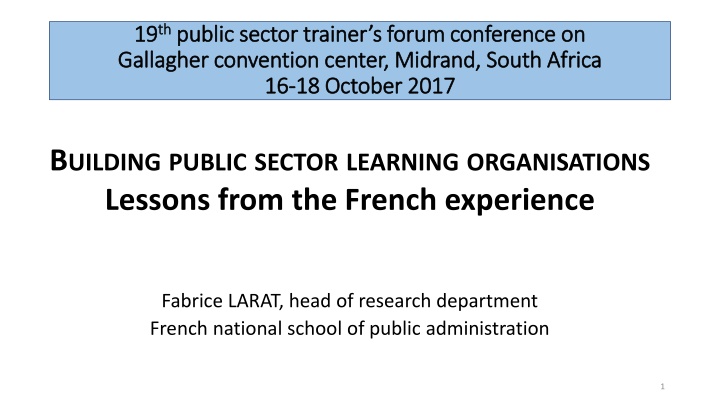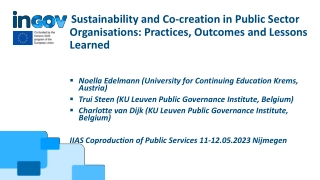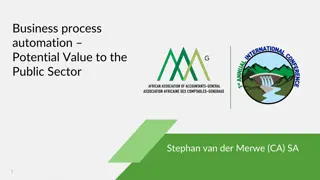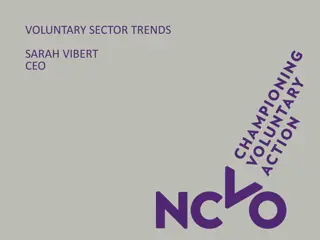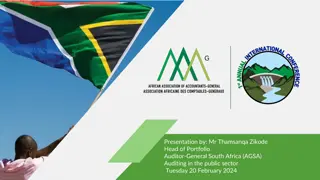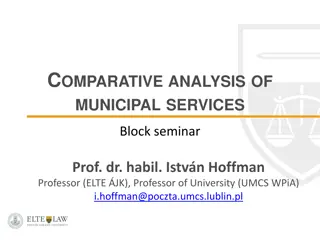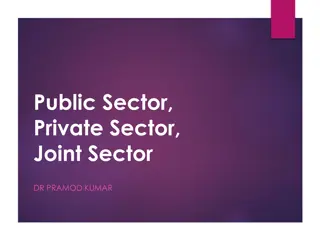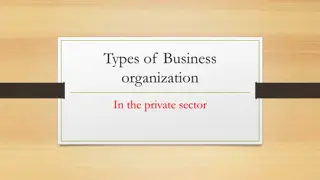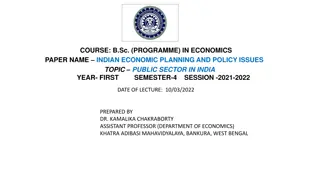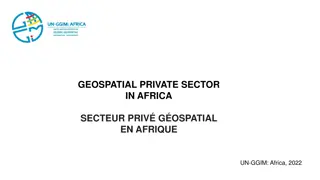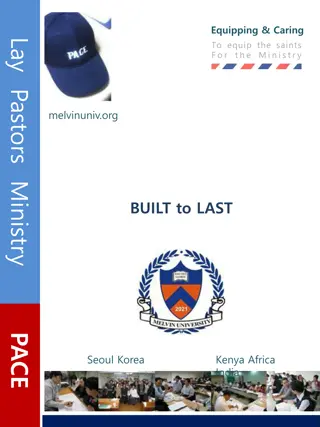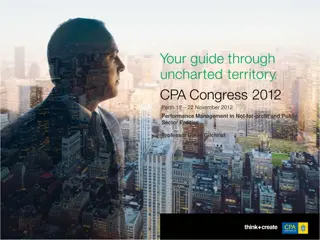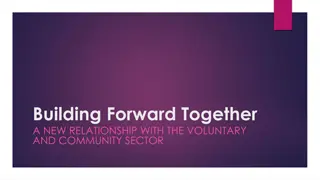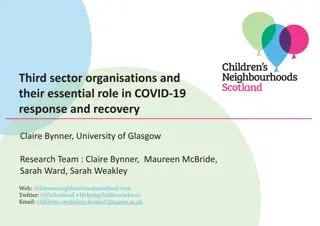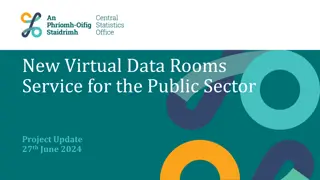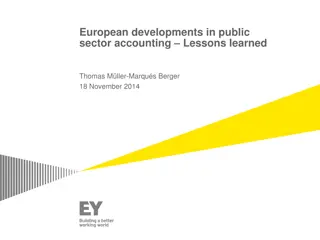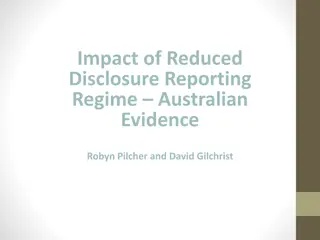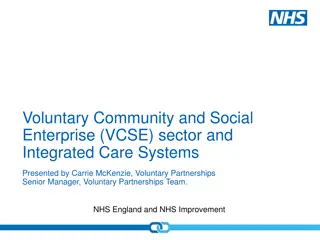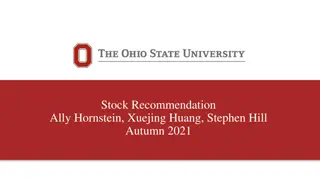Building Public Sector Learning Organizations: Insights and Challenges
Explore the journey of public sector organizations towards becoming learning entities, focusing on the French experience as shared at a specialized forum. Delve into the importance of organizational learning, obstacles faced in the process, key mechanisms, sources of motivation, and the critical role of institutions like the French National School of Public Administration in cultivating a culture of continuous learning among civil servants.
Download Presentation

Please find below an Image/Link to download the presentation.
The content on the website is provided AS IS for your information and personal use only. It may not be sold, licensed, or shared on other websites without obtaining consent from the author.If you encounter any issues during the download, it is possible that the publisher has removed the file from their server.
You are allowed to download the files provided on this website for personal or commercial use, subject to the condition that they are used lawfully. All files are the property of their respective owners.
The content on the website is provided AS IS for your information and personal use only. It may not be sold, licensed, or shared on other websites without obtaining consent from the author.
E N D
Presentation Transcript
19 19th thpublic sector trainer s forum conference on public sector trainer s forum conference on Gallagher convention center, Gallagher convention center, M Midrand 16 16- -18 October 2017 18 October 2017 idrand, South Africa , South Africa BUILDING PUBLIC SECTOR LEARNING ORGANISATIONS Lessons from the French experience Fabrice LARAT, head of research department French national school of public administration 1
Three preliminary questions about Three preliminary questions about Building public sector learning organisations 1) Can organisations learn? 2) Why organisations and especially public organisations have to learn? What learning for an organisation exactly means ? 3) How to make sure that public organisations and public servants are open for learning from their environment and from themselves? 2
OBSTACLES OBSTACLES TO TO THE THE CAPACITY CAPACITY OR IN IN AND AND BY OR WILLINGNESS WILLINGNESS TO BY ORGANIZATIONS ORGANIZATIONS TO LEARN LEARN Traditions Routine Lack of trust between individuals within the organisation and towards external actors Difficulty to mobilize civil servants 3
O ORGANIZATIONAL RGANIZATIONAL LEARNING according to Moynihan according to Moynihan and LEARNING MECHANISMS MECHANISMS and Landuyt Landuyt (2009) (2009) Resources Information systems Mission orientation Decision flexibility Learning forums 4
S SOURCES OURCES AND FOR FOR PUBLIC PUBLIC SECTOR AND REASONS REASONS TO SECTOR ORGANIZATIONS ORGANIZATIONS TO LEARN LEARN New technologies open new opportunities Financial pressure Benchmark and reference to best practices New demands from users Internal impulses (innovation) 5
ENAs missions ENA s missions Recruit and provide initial training to French and foreign high- level civil servants. Ensure continuing professional and advanced training for French and foreign high-level civil servants, through long- or short-term sessions. Foster bilateral and multilateral European and international relations in the fields of public governance and administration. Educate students on European issues and prepare them for the competitive examinations required to enter the European Union s institutions 6
ENAs specificities ENA s specificities Not a university but a school of applied education under the Prime minister Focus only on the training of senior civil servants Trainees are already all very well educated prior to joining ENA and selected very carefully No permanent faculty: courses are mainly taught by practitioners (senior civil servants, experts) Small Organization: Staff: 200 Trainees p.A. : 180 for pre service training programme + 70 foreign students + ca. 500 trainees in the field of permanent education 7
ENAs organizational learning ENA s organizational learning mechanism related related to to its mission its mission Adjusting public administration training and education programmes to the needs mechanism 8
Organizational learning Organizational learning mechanism related to The The group of high level expert in charge of coordinating the content of group of high level expert in charge of coordinating the content of the pre the pre- -service training programme service training programme mechanism related to resource mobilization resource mobilization Members of the Board and fields of teaching covered Public finances: Top level civil servant from the ministry of finances Territorial organisation of the state: A prefect Law making and public law : Judge at the State council Public management : President of a regional court of auditors European Union issue : Former adviser at the general secretary for coordinating EU issues 9
Overview on the organizational learning mechanisms Overview on the organizational learning mechanisms used at ENA used at ENA Learning mechanism related to mission orientation Adjusting public administration training and education programmes to the needs Learning mechanism related to resource The group of high level expert in charge of coordinating the content of the pre-service training programme Data regarding the sociological origins of pre- service trainees Perception survey regarding the usefulness of the different parts of the curriculum ENA s community for pedagogical innovation Information systems learning forum 10
F FORMS ORMS OF AT ENA ENA TO OF EXPOSURE EXPOSURE AT TO DIFFERENT DIFFERENT KNOWLEDGE KNOWLEDGE AND AND PRACTICES PRACTICES Orientation Public targeted Logic Means taken Form of exposure to PA/PM models and instruments Canonical knowledge managerial and potential Knowledge required to pass the competitive examination + leadership Internships ENA national Teaching and training Observation on the job Curriculum trainees Using new instruments Passive: Contact with foreign civil servants Internal (needs French system) ENA foreign Mixing publics Integration dimension into training programs of international of trainees Active foreign PA schools comparison with Exchange of experience Monitoring state of the art in the field of public research Team charge developing training ENA in of Influence (in) Participation international networks: into administration External at Benchmark (OCDE) practices and Best 11
Bibliographical Bibliographical references references Fabrice LARAT "Internal and External Quality Control Mechanisms: Lessons Drawn from the Ecole Nationale d Administration of France", In Allan ROSENBAUM (Ed), "Standards of excellence in public administration training and education". Bratislava, NISPACE Press, 2015, p. 61-74 Donald MOYNIHAN and Noel LANDUYT How do public oganisations learn. Bridging cultural and structural perspectives Public administration review, 69(6) 2009 Max WISSER and Kim VAN DER TOGT Learning in public sector organizations: a Theory of action approach , Public organisation review, 2015 12
A competitive entrance examination Why an entrance examination? Tous les Citoyens tant gaux ses yeux sont galement admissibles toutes dignit s, places et emplois publics, selon leur capacit , et sans autre distinction que celle de leurs vertus et de leurs talents . 3 different examinations the concours externe for students having received a university-level diploma for at least the equivalent of three years of studies after secondary school ( A Levels+3), all candidates now have a Master degree. the concours interne for career civil servants or government employees with at least four years professional experience; no diploma is required the troisi me concours for elected officials, labor leaders and private-sector employees, with a total of at least eight years of professional or elected experience; no diploma is required. These 3 competitive entrance examinations have been open to citizens of the European Union since 2004. ENA 13
A competitive entrance examination The qualifying examination 5 written essays Public law Economics Contemporary societal issues Social matters Public finances The examination for admission 5 oral examinations - Career interview with a panel - Interaction group assessment - European issues - International questions - Foreign language (English will be compulsory in 2018) ENA 14
Curriculum: focus on public management (accounts for 12% of the final mark) Leading a team Human resource management + social dialog Project management + crisis management Negotiation and communication Budgeting Change management (modernization process, administrative simplification and better regulation, impact assessments, introducing innovation in public services) Evaluation of public policies Digital technology and e-administration ENA 15
Academic and practical subjects : 9 months Law (Quality of law) European and internatio nal issues Public policies and territories 2 foreign languages Economics and public finances Public managem ent (English is compulsory) ENA 16
